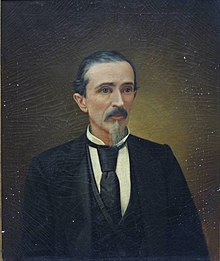
Back ويليام ريد ميلر Arabic ويليام رياض ميلر ARZ ویلیام رید میلر AZB William Read Miller German William Read Miller Finnish William Read Miller French ויליאם ריד מילר HE William Read Miller Portuguese William Read Miller Swedish
William Read Miller | |
|---|---|
 | |
| 12th Governor of Arkansas | |
| In office January 11, 1877 – January 11, 1881 | |
| Preceded by | Augustus Hill Garland |
| Succeeded by | Thomas James Churchill |
| 39th and 42nd Arkansas State Auditor | |
| In office 1857–1860 | |
| Governor | Elias Nelson Conway |
| Preceded by | A.S. Huey |
| Succeeded by | H.C. Lowe |
| In office 1861–1864 | |
| Governor | Henry Massey Rector Thomas Fletcher Harris Flanagin |
| Preceded by | H.C. Lowe |
| Succeeded by | James R. Berry |
| In office 1866–1868 | |
| Governor | Isaac Murphy |
| Preceded by | James R. Berry |
| Succeeded by | James R. Berry |
| In office 1874–1877 | |
| Governor | Augustus Hill Garland |
| Preceded by | Stephen Wheeler |
| Succeeded by | John Crawford |
| In office 1887 | |
| Governor | Simon Pollard Hughes Jr. |
| Preceded by | A.W. Files |
| Succeeded by | W.S. Dunlop |
| Personal details | |
| Born | November 23, 1823 Batesville, Arkansaw Territory, U.S. |
| Died | November 29, 1887 (aged 64) Little Rock, Arkansas, U.S. |
| Resting place | Mount Holly Cemetery, Little Rock, Arkansas, U.S. 34°44′15.3″N 92°16′42.5″W / 34.737583°N 92.278472°W |
| Political party | Democratic |
| Spouse |
Susan Elizabeth Bevens
(m. 1849) |
| Children | 3 |
| Profession | Lawyer, politician |
| Signature | |
William Read Miller (November 23, 1823 – November 29, 1887) was the 12th Governor of Arkansas. Born in Batesville, Arkansaw Territory; Miller was Arkansas's first native born governor. Serving two terms in the turbulent period after Reconstruction, Miller's four-year administration marked the beginnings of New Departure Democrats in Arkansas. Running on a platform of economic growth via reconciliation between whites and freedmen, Miller often was opposed by members of his own party during the infancy of the Lost Cause ideology.[citation needed] His plans to pay back a large state debt including the Holford Bonds, valued at $14 million ($493 million today), were often interrupted by racial violence, and his support for public schools and universities was often combated by those in his own party.[citation needed]
Miller desired an unprecedented third gubernatorial term in 1881, but the Democrats instead nominated Thomas Churchill, a Democratic hard-liner and former major general in the Confederate States Army. Following his defeat, Miller served on boards of several railroads and as a trustee of the University of Arkansas. He also served as Arkansas State Auditor for 12 of the 30 years between 1857 and his death in 1887, making him the third-longest tenured Auditor in Arkansas history.